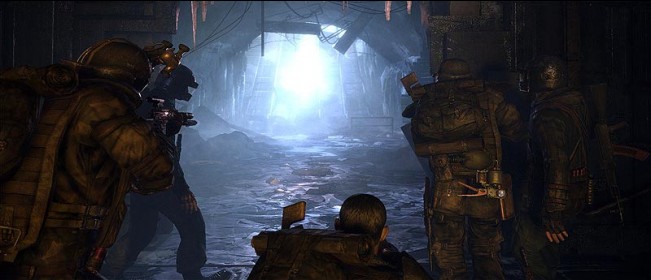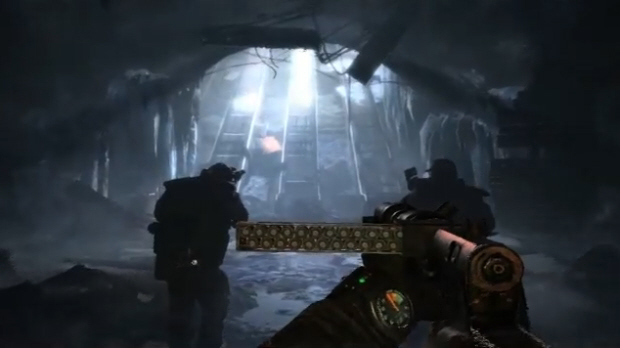This post has not been edited by the GamesBeat staff. Opinions by GamesBeat community writers do not necessarily reflect those of the staff.
 For the kind of person who plays video games to experience scenarios which would be impossible to replicate otherwise, Metro 2033 seems like the ideal game. The dark, mutant-infested tunnels and dimly-lit communities of impoverished Russians offer a look at life in Moscow after something — the game doesn't make it especially clear, but one can assume a nuclear holocaust — causes humans to retreat from the irradiated topside into the subway tunnels and metro stations below. As life in the metro develops, military-grade bullets, a rarity that's coveted for its ability to kill mutants efficiently, has become the primary form of currency, and many of the stations create their own loose governments.
For the kind of person who plays video games to experience scenarios which would be impossible to replicate otherwise, Metro 2033 seems like the ideal game. The dark, mutant-infested tunnels and dimly-lit communities of impoverished Russians offer a look at life in Moscow after something — the game doesn't make it especially clear, but one can assume a nuclear holocaust — causes humans to retreat from the irradiated topside into the subway tunnels and metro stations below. As life in the metro develops, military-grade bullets, a rarity that's coveted for its ability to kill mutants efficiently, has become the primary form of currency, and many of the stations create their own loose governments.
With literally a novel's worth of fiction behind its premise, it's unfortunate that the story of Metro doesn't feel as accomplished as it should be. You can grasp a certain amount of backstory simply through context, sure, but I didn't even know about the differences in government between metro stations until I read as much — the game itself never made mention or even hinted at this concept, nor does it explain why this far into future, the Reds and Nazis are still at war in Moscow. For the majority of the game, you're being forcefully guided along a very linear path, left to explore the stations in short bursts to fill up on gas mask filters and ammo, and buy better guns.
Linearity isn't itself a bad thing, and much of the "experience" of Metro works on most every level. The depressing atmosphere is executed well enough to make longer visits to the world of Metro emotionally draining; both the isolate above-ground sections and the stressful underground sections successfully make you feel as desperate as your character should be. Set pieces such as being snuck into a station underneath a railroad seesaw drive home the feeling of desperation, but the rich fiction isn't put to much use, which is unfortunate.
 The biggest aspect from the novel that affects gameplay is the bullet-based monetary system. Military-grade ammo litters the game just as regular ammo, but the not only is the military-grade ammo more powerful than the homemade ammo of the metro, it can also be used to buy guns, armor, and be traded in for larger amounts of other kinds of ammo. It's meant to be a panic button of sorts, though I never used it, mostly due to the fact that regular ammo takes care of monsters and people just fine. The more powerful ammo becomes more important on Hard difficulty, but not so much as to force you to drain your cash reserves in order to save yourself.
The biggest aspect from the novel that affects gameplay is the bullet-based monetary system. Military-grade ammo litters the game just as regular ammo, but the not only is the military-grade ammo more powerful than the homemade ammo of the metro, it can also be used to buy guns, armor, and be traded in for larger amounts of other kinds of ammo. It's meant to be a panic button of sorts, though I never used it, mostly due to the fact that regular ammo takes care of monsters and people just fine. The more powerful ammo becomes more important on Hard difficulty, but not so much as to force you to drain your cash reserves in order to save yourself.
But aside from the grim setting, that's the most interesting thing about Metro 2033. The details on armor and the environment look fantastic, with plenty of scratches and rust showing the age of the many objects in the world, but the Uncanny Valley makes itself known in all of the characters. The story, though intriguing at first, begins to wear thin as more and more of it reveals itself through objectives such as "Go here and activate this lever" and "Try to sneak by these guards before you realize you don't know where you're going and you're discovered." Even at only eight or so hours, to latter half of the game drags on for far too long.
The shooting itself is fine, with the mandatory pistols, rifles, and shotguns of the genre, along with the standard controls for anything first-person. However, the game seems to be designed much like a survival-horror game, with ammo being scarce. By the end of the game, however, you'll likely have more ammo than you know what to do with. It's either an easy survival shooter, or a viciously withholding action shooter.
The first couple of hours or so of Metro are remarkable; there are moments early on that hint at what could've been a wonderful experience, but it ends as a perfect example of untapped potential. The touches of harsh realism that apply to both the story and the gameplay are the most unique aspect of the game, but many of minor details add up and hold it back from being as good as it could've been. If nothing else, I'm holding out for a sequel, and awaiting my copy of the book.
Score: 3/5
